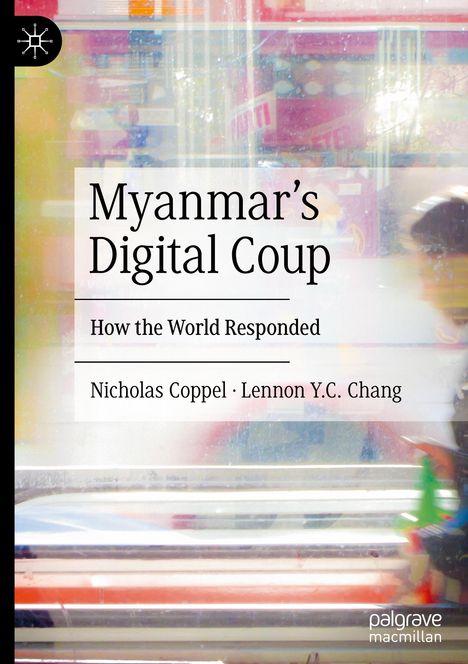Lennon Y. C. Chang: Myanmar's Digital Coup, Gebunden
Myanmar's Digital Coup
- How the World Responded
(soweit verfügbar beim Lieferanten)
- Verlag:
- Springer Nature Switzerland, 07/2024
- Einband:
- Gebunden, HC runder Rücken kaschiert
- Sprache:
- Englisch
- ISBN-13:
- 9783031586446
- Artikelnummer:
- 11925693
- Umfang:
- 244 Seiten
- Nummer der Auflage:
- 2024
- Ausgabe:
- 2024
- Gewicht:
- 433 g
- Maße:
- 216 x 153 mm
- Stärke:
- 18 mm
- Erscheinungstermin:
- 24.7.2024
- Hinweis
-
Achtung: Artikel ist nicht in deutscher Sprache!
Klappentext
This book explores the nature, scope, merits and limits of international responses to Myanmar¿s February 2021 coup. The novelty of this book lies in its analysis of the coup in the digital age. While the literature on Myanmar addresses issues such as earlier periods of reform, Myanmar¿s political transition, the Saffron revolution, and human rights, there is still limited research that looks into the influence of digitalised Myanmar on the post-coup Civil Disobedience Movement and protestors. Myanmar opened and changed enormously in the past ten years. The use of technology and the Internet increased phenomenally, exposing Myanmar¿s citizenry to new ideas, experiences and ways of viewing the world. The impact of these developments on responses to the 2021 coup is the focus of this book.
Myanmar¿s opening to the world and its digitalisation has made this coup different from the three previous coups. The book's starting point is that diplomacy is no longer (if it everwas) the preserve of governments and diplomats. International organisations, not-for-profit organisations, large corporations, academia, civil society, social media, and even individuals have all been engaged and sought to influence developments.
Drawing extensively on primary sources (official statements by UN agencies, foreign governments, international corporations, NGOs and Burma campaign activists) and experiences as a senior diplomat and an academic working with Myanmar¿s government to build cyber capacity and cyber security awareness, this book takes a fresh look at all forms of international behaviour that seek to bring about change in a rogue or pariah state. The book will be the first to study the part played by Gen Z and their facility with smart phone technology to mobilise, inform and build opposition to the coup. To what extent did the youth of Myanmar learn from Hong Kong, Taiwan, Thailand and the so-called ¿milk tea alliance¿? How has dependenceon the internet affected the operations of the security forces and the Civil Disobedience Movement? How did both sides deploy misinformation and disinformation to achieve their respective goals?
The book thus provides an informative guide for those seeking an understanding of what has happened and what, short of a military intervention, can be done about it. It examines international responses in the first year following the coup, candidly assessing their feasibility, efficacy and utility. Recent developments are situated within the context of Myanmar¿s modern history and the discourse on the effectiveness of sanctions compared with engagement.
The book also critically examines ASEAN¿s role ¿ how does ASEAN see its role, how does the National Unity Government regard ASEAN endeavours, and how does the rest of the world view ASEAN¿s capacity to address Myanmar¿s problems? We evaluate ASEAN¿s principle of non-interference in the internalaffairs of member states. Does this principle matter more to it than judgments about its weakness and inability to deal with breaches of the ASEAN Charter?


